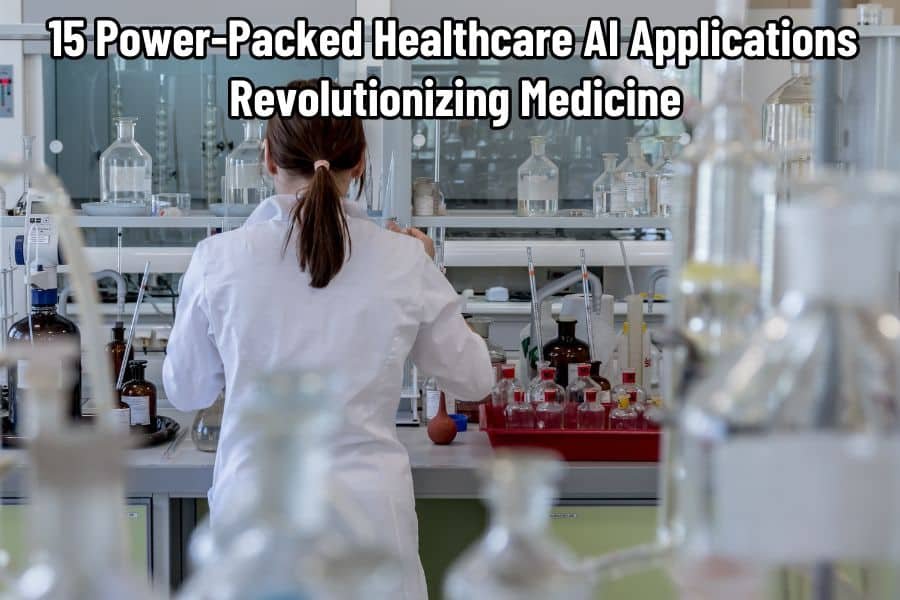Explore the cutting-edge world of healthcare AI applications with our in-depth look into how artificial intelligence is reshaping and revolutionizing medicine. From pioneering diagnostic approaches and enhancing surgical precision to mitigating risks and ensuring compliance in medical records management, delve into a resourceful guide that unveils the transformative impact and future prospects of AI applications in healthcare. Navigate through valuable insights, real-world applications, and expert analyses, all meticulously curated to equip you with a profound understanding of this technological marvel in the medical field.
Introduction
Undeniably, we’ve embarked on an epoch where tech solutions and healthcare aren’t just intertwined; they’re inseparable. The impeccable amalgamation of Artificial Intelligence (AI) with healthcare is not merely a phenomenon. It’s a revolutionary stride, moving forth, shaping, and often, saving our lives in unprecedented ways. Healthcare AI applications aren’t glimpses of the future; they are the present, actively transforming medicine and patient care with dexterity and precision.
Imagine a realm where accurate cancer diagnoses are not confined to the sophisticated labs or where rare diseases aren’t enigmatic anymore. This isn’t a utopian dream but a tangible reality, thanks to the relentless advancement in healthcare AI applications. The essence of AI in healthcare encapsulates a plethora of aspects, right from robot-assisted surgeries, safeguarding medical records, to acting as a sentinel in fraud detection.
In a universe where data is king, AI doesn’t merely compute; it computes with sagacity, ensuring targeted treatments are not generalized, but are astutely personalized. It transcends the boundaries of traditional methods, amplifying the efficacy of healthcare provision by enhancing early diagnoses, streamlining redundant tasks, and even engaging in the meticulous development of new medicines.
Moreover, it’s not just about treatment; it’s about accessibility and accuracy. Automated image diagnosis, intelligent customer service chatbots, and virtual health assistants aren’t just jargon. They’re here, actively reshaping our experiences, turning the enigma of what was once thought to be future medicine into an experiential reality today.
Stay with me as we traverse through the meticulous realms where healthcare AI applications don’t merely add value but redefine it, crafting a healthcare system that’s not only robust, efficient, and precise but also universally accessible and astoundingly accurate. Intrigued? Buckle up as we explore the unseen, unravel the intricate, and understand the complex world where AI doesn’t just assist healthcare – it revolutionizes it.
AI Accelerating Accurate Cancer Diagnosis

Immerse yourself in a world where healthcare AI applications reshape the landscape of oncology, intertwining technical prowess with medical ingenuity, forging a path that redefines cancer diagnosis and treatment. It’s not merely about detecting; it’s about accelerating, amplifying, and accentuating every stride towards a cure.
Harnessing AI for Precise Tumor Identification
Picture this: A system that not only identifies tumors with a precision that rivals the most seasoned professionals but does so with a speed that exponentially accelerates diagnostic processes. This isn’t the future; this is the era of healthcare AI applications. Employing sophisticated algorithms and learning from a vast expanse of data, AI ventures where the human eye sometimes falters, discerning patterns and anomalies with staggering accuracy and expeditious proficiency.
Advanced diagnostic tools leveraging AI dive into intricate image analyses, meticulously identifying and assessing even the most concealed tumors. This isn’t merely about speed but a holistic elevation of diagnostic accuracy and efficiency, ensuring that every patient can embark on a treatment journey that’s both timely and meticulously crafted.
Improving Predictive Analytics in Oncology
Then, we traverse to the realm of predictive analytics, where healthcare AI applications morph into an intuitive force that doesn’t just diagnose but prognosticates, offering a foresight that’s founded on data, yet astonishingly precise. Can we, perhaps, predict the progression of a disease? Can we foresee the efficacy of a particular treatment regimen on an individual basis?
Absolutely, and AI does so by sifting through colossal data reservoirs, comprehending patterns and trends, enabling healthcare professionals to predict tumor behavior, anticipate disease progression, and formulate a patient-centric, highly personalized therapeutic approach. AI extrapolates, it envisages, providing oncologists with a tool that’s not only predictive but indispensably insightful.
In the grander scheme, it’s about crafting a healthcare trajectory that’s not reactive but proactively strategic, ensuring each patient isn’t merely a recipient of healthcare but an active participant in a journey meticulously mapped out, with AI acting as an astute, data-driven co-pilot.
So, as we navigate through this incisive exploration, it becomes vividly apparent: healthcare AI applications are not supplementary; they are integral, entwining with oncology to forge a future where cancer diagnosis and treatment are remarkably precise, astoundingly rapid, and astutely predictive.
Let’s march ahead to the next application, where AI in healthcare means better patient care and early diagnosis of fatal blood diseases.
Proactive Steps for Early Diagnosis of Fatal Blood Diseases

Embark on a journey where healthcare AI applications pivot from being supportive to becoming catalytic in changing the trajectory of hematological diagnosis and management. It’s not simply about navigating through data but harnessing AI to preemptively diagnose, strategically manage, and profoundly understand fatal blood disorders, crafting a pathway that isn’t simply curative, but profoundly preventative.
Implementing AI to Decode Hematological Disorders
Peering into the microscopic world of our circulatory system, healthcare AI applications revolutionize our ability to decipher the enigma that often envelopes hematological disorders. Imagine a diagnostic realm where AI dives deep into cellular data, discerning anomalies, and irregularities at a level so intricate, yet so expeditiously, that it not only elevates diagnostic precision but slashes the time-to-diagnosis substantially.
Through implementing robust machine-learning models, AI is adept at decoding the complex symphony of signals, symptoms, and cellular data, often discerning pathological indicators even before they metamorphose into symptomatic realities. This isn’t just technology; it’s a digital ally, relentlessly working behind the scenes, ensuring every potential hematological anomaly is identified, understood, and addressed with a precision that’s not merely clinical but profoundly personal.
Ensuring Timely Intervention with Predictive Modelling
Transcend into a realm where AI not only diagnoses but actively anticipates, crafting a medical landscape where predictive modelling doesn’t merely ensure timely intervention but does so with an accuracy that’s as anticipative as it is astute. Healthcare AI applications aren’t simply reactive; they are phenomenally predictive, providing healthcare professionals with a tool that anticipates and proactively responds to potential future complications and nuances of blood disorders.
By comprehensively analyzing patterns, symptomatology, and patient data, AI crafts a predictive model that’s not merely data-informed but is dynamically adaptive, consistently recalibrating itself with every new data input. This ensures that healthcare interventions aren’t just timely but are preemptively strategic, guaranteeing that patient care isn’t merely a response but a proactive, data-driven action, considerably mitigating risks and enhancing patient outcomes.
As we navigate through this labyrinth of possibilities, the confluence of AI and hematology isn’t simply a collaboration; it’s a revolution. A revolution where healthcare AI applications don’t merely identify and treat but anticipate and prevent, assuring that every patient is enveloped in a cocoon of care that’s not just medically profound but technologically pioneering.
Next application up is all about AI and customer service.
Elevating Customer Experience with Service Chatbots
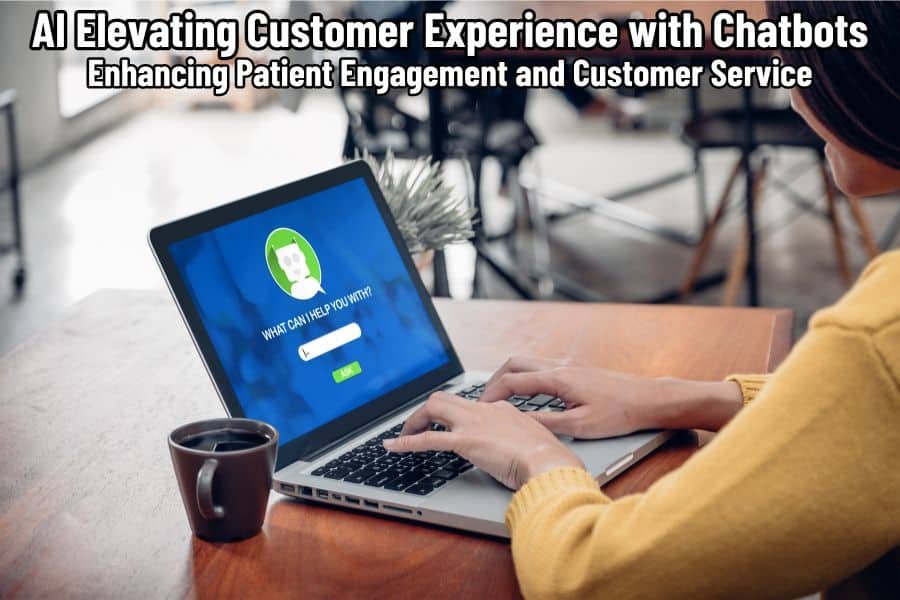
Immerse yourself in a realm where healthcare AI applications seamlessly interweave with customer service, curating an experience that is not merely about resolving queries but about crafting interactions that are engaging, insightful, and unequivocally seamless. In this digital era, the integration of AI within customer service isn’t an innovative addition; it’s an imperative, ensuring that every interaction isn’t merely transactional but transformational.
Enhancing Patient Engagement through Conversational AI
Envision a dialogue, a two-way communication where conversational AI doesn’t merely respond but understands, empathizes, and engages in a manner that is both organic and insightful. Healthcare AI applications are sculpting a paradigm where the patient is not merely heard but profoundly understood, and every interaction is not mechanized, but inherently personalized.
Delving into the sea of conversational AI, we observe intelligent chatbots that transcend the conventional, ensuring that every query is met with an answer that isn’t simply accurate but is contextually relevant and intuitively delivered. It’s not merely about providing information but doing so in a manner that enhances patient engagement, ensures clarity, and fosters a relationship that transcends the digital divide, forming a bond that is both reliable and reassuring.
Ensuring Continual Support with Intelligent Chatbots
Now, journey a step further into a domain where intelligent chatbots are not limited by time, resource, or availability. Healthcare AI applications unleash a realm where support is not confined to business hours, ensuring that every patient, every query, and every concern is addressed with immediacy and precision, 24/7.
The amalgamation of AI and customer service crafts a landscape where chatbots evolve from being reactive interfaces to becoming intelligent entities, ensuring every interaction is wrapped in consistency, accuracy, and a profound understanding of individual patient needs and histories. This is about ensuring that support is not only continual but evolves, learns, and adapts, ensuring every interaction is better than the last, and every patient interaction is not merely facilitated but is undeniably enriched.
Next, let’s turn our attention to AI and virtual health assistants.
Navigating Patient Care with Virtual Health Assistants

Dive into an enlightening journey where healthcare AI applications cease to be mere technical entities and metamorphose into compassionate, understanding, and intelligent virtual health assistants. This isn’t merely an exploration; it’s an experience where technology and healthcare intertwine to create a patient-care ecosystem that’s not just data-driven but is intuitively patient-centric, revolutionizing each step of the healthcare journey with a meticulous blend of empathy and expertise.
Personalizing Patient Interactions through AI
Imagine a scenario where every interaction with a virtual health assistant isn’t merely a data exchange but a personalized, compassionate, and insightful conversation. The power of healthcare AI applications manifests in a manner that ensures each interaction isn’t merely informed but is inherently personalized, comprehending individual patient histories, preferences, and needs to curate interactions that are as insightful as they are empathetic.
By utilizing AI’s immense data-processing and learning capabilities, virtual health assistants transcend traditional healthcare interactions, ensuring that every piece of advice, every answer, and every interaction is not merely accurate but is inherently personalized, fostering a patient-care relationship that’s not simply about healing but about understanding, caring, and empathizing in a manner that’s profound and genuine.
Streamlining Daily Health Management with AI Assistants
Venture further into a realm where daily health management isn’t merely efficient but is inherently intuitive and staggeringly accurate, thanks to the seamless integration of healthcare AI applications. Virtual health assistants are not simply digital entities; they are intelligent, learning, and adapting entities that streamline daily health management in a manner that’s not just organized but is empathetically strategic.
From reminding patients of their medications, appointments, and exercises to monitoring health parameters and providing instant support, AI assistants ensure that every aspect of daily health management is not merely tracked but is optimized, ensuring each patient navigates their healthcare journey with an ally that’s not merely technical but is intuitively understanding, providing care that’s both meticulous and meaningfully personalized.
Continuing our journey, let’s talk about AI solutions for treatment of rare diseases.
Unveiling Solutions for Treatment of Rare Diseases

Embark on an exploratory venture into the realm where healthcare AI applications forge pathways through the often-murky waters of rare diseases, deploying deeply integrated, data-driven solutions that aren’t merely curative, but are audaciously pioneering. This juncture is not merely about finding solutions; it’s about constructing a realm where technology and healthcare converge to illuminate the darkened corridors of rare and complex diseases, ensuring that no patient is ever left wandering in diagnostic oblivion.
Utilizing AI for In-depth Genetic Research
Gaze into the microscopic world where the complexity of genetic material meets the computational prowess of AI. Here, healthcare AI applications serve not as tools, but as diligent researchers, traversing the intricately woven genetic tapes, unearthing clues and insights that humans might overlook. This is a domain where AI excavates through genetic data, ensuring that the mutations and anomalies linked with rare diseases are not left shrouded in the enigmatic depths of our DNA.
The journey of employing AI in genetic research is not merely technical; it’s profoundly transformative. It ensures that genetic anomalies, mutations, and variations associated with rare diseases are unearthed, understood, and contextualized, crafting a pathway that allows researchers and healthcare professionals to not merely understand but innovate, developing treatments that are as precise as they are impactful, ultimately moulding a future where rare does not equate to untreatable.
Enhancing Diagnostic Accuracy for Uncommon Illnesses
Step further, into a domain where healthcare AI applications magnify our diagnostic capabilities, ensuring that rare diseases are not misinterpreted as medical anomalies, but are accurately diagnosed, mapped, and treated with unprecedented precision. It’s a realm where AI does not merely observe but perceives, recognizing patterns, correlations, and anomalies that are often elusive to the human eye, thereby ensuring that diagnoses are not merely accurate but are astoundingly precise.
Leveraging AI for diagnosing rare diseases melds data analytics with empathetic care, guaranteeing that patients are not subjected to a barrage of inconclusive tests, but are accurately diagnosed, ensuring that their journey is not peppered with uncertainties and ambiguities, but is anchored in diagnostic certainty and therapeutic precision. This isn’t merely about accurate diagnosis; it’s about providing hope, certainty, and a pathway that’s clear, concise, and profoundly patient-centric.
In our next application we’ll examine AI and targeted treatments.
Strategic Approaches in Targeted Treatment

Dive into an era where the medical world intertwines seamlessly with artificial intelligence, delivering targeted treatment protocols that aren’t merely precise but spectacularly personalized. Harnessing healthcare AI applications doesn’t merely signify a technical advancement but unravels a paradigm where therapeutic approaches are not generalized but are eloquently tailored with precision and personalization.
Employing AI to Identify Optimal Treatment Protocols
Envision a healthcare panorama where treatment protocols are not generalized but are astoundingly specific. With healthcare AI applications, treatment transcends beyond mere administration and ventures into a realm where it’s perpetually optimized. Each patient is bestowed with a protocol that’s not merely effective but is meticulously crafted to echo their unique healthcare needs and nuances.
AI, in this scenario, sifts through voluminous data, identifying patterns, responses, and correlations that help healthcare professionals carve out treatment protocols that are inherently effective, minimizing trial and error and accentuating efficacy. It’s a landscape where the journey from diagnosis to recovery isn’t muddled with uncertainties but is lit with the torch of data-driven precision. Every step taken is not merely informed but is intrinsically optimized, paving the pathway towards treatment that’s not merely effective but is impeccably accurate.
Advancing Personalized Medicine with Intelligent Algorithms
Stepping further into the universe of personalized medicine, healthcare AI applications morph from being mere technical tools to becoming intelligent architects, constructing therapeutic pathways that are not mere paths but are personalized trails. Each patient’s journey towards recovery is not a generalized route but a personalized trek, meticulously tailored to resonate with their unique healthcare demands and therapeutic requirements.
This voyage through the realms of AI-driven personalized medicine ensures that each treatment protocol, medication, and therapeutic approach is not a generalized prescription but a personalized inscription. Penned with the ink of data-driven insights, ensuring every therapeutic step taken is not merely a step forward but is a step towards a future where healthcare is not merely administered but is eloquently personalized.
Proceeding forward, let’s delve into the next application, AI automation of redundant healthcare tasks.
Streamlining Operations: Automation of Redundant Healthcare Tasks

Embark on a journey where healthcare AI applications emerge as the unsung heroes, automating the sprawling web of redundant tasks that often permeate the healthcare sector. The voyage is not solely about technological prowess; it’s a revelation of how the strategic amalgamation of healthcare knowledge and AI can elegantly streamline operations. This enables healthcare professionals to pivot their focus from mechanical tasks to the core of healthcare: empathetic patient care.
Enhancing Efficiency with AI-Driven Task Automation
Imagine a world where mundane, repetitive tasks don’t hamstring healthcare professionals. A seamlessly efficient operational ecosystem where administrative tasks such as data entry, appointment scheduling, and billing are handled not manually, but through an intricately devised, AI-driven framework. Healthcare AI applications swing open the doors to this reality.
In this domain, AI doesn’t just automate; it elevates. It navigates through vast expanses of data, ensuring that every entry, every scheduled appointment, and every processed bill is not merely a transaction, but a cog in a meticulously streamlined operational wheel. This isn’t merely about easing operational workflows; it’s about repositioning resources, ensuring that every healthcare professional can direct their expertise and care where it’s truly imperative – towards the patient.
Reducing Human Error through Automated Systems
Venturing deeper, healthcare AI applications not only enhance operational efficiency but forge a pathway towards dramatically reduced human errors. Automated systems, devised with a foundation of AI, ensure that every entry is accurate, every bill is error-free, and every appointment is systematically scheduled and intimated. In this world, automated systems aren’t mere technical platforms; they’re vigilant overseers, ensuring accuracy permeates every facet of operational tasks.
This goes beyond mere automation; it’s a cultivation of an operational ecosystem where accuracy is ingrained, ensuring that every task, no matter how minute, is executed with unparalleled precision. It’s about crafting a realm where healthcare professionals can immerse themselves in delivering care, assured in the knowledge that the backend operations are not just automated, but are executed with precision that only AI-driven systems can assure.
Let’s navigate on to our next application, AI and management of medical records.
AI Ensuring Compliance in Management of Medical Records

Let’s traverse through the intricate web of medical records, where data isn’t merely numeric but holds the potential to be life-altering. The meticulous management of this data becomes not just a technical necessity but a moral obligation. And here, healthcare AI applications stand tall as the silent yet formidable sentinels, safeguarding every byte of critical data, ensuring it’s not merely stored but is impeccably managed, compliantly handled, and fiercely protected.
Implementing AI to Safeguard Patient Data Integrity
Immerse into a realm where healthcare AI applications shield every speck of data with a robust armory of algorithms and protocols, ensuring that every piece of patient information is not merely stored but is guarded with impenetrable security and unyielding integrity. AI systems meticulously scan, monitor, and safeguard every entry, ensuring that the sanctity of patient data is not compromised.
This journey moves beyond mere data storage, venturing into a territory where every piece of information is accorded its due respect and protection. Here, AI isn’t just a tool; it’s a vigilant guardian, ensuring that every datum is stored, retrieved, and utilized with the utmost adherence to compliance and unwavering respect for privacy and integrity.
Optimizing Data Management with Intelligent Systems
Navigating forward, healthcare AI applications evolve, becoming the architects of an optimized, efficient, and intelligent data management ecosystem. These systems maneuver through colossal volumes of data, ensuring not just secure storage but intelligent categorization, swift retrieval, and systematic archiving, ensuring that every piece of information is not just available but is instantly accessible when needed.
In this sphere, healthcare AI applications sculpt an environment where data management isn’t just mechanized but is intelligently orchestrated, ensuring every byte of information is not merely a stored datum but is a readily available, securely stored, and efficiently managed entity, poised to be leveraged whenever it’s summoned.
Next on our list of applications to explore is AI and medication management.
AI Medication Management
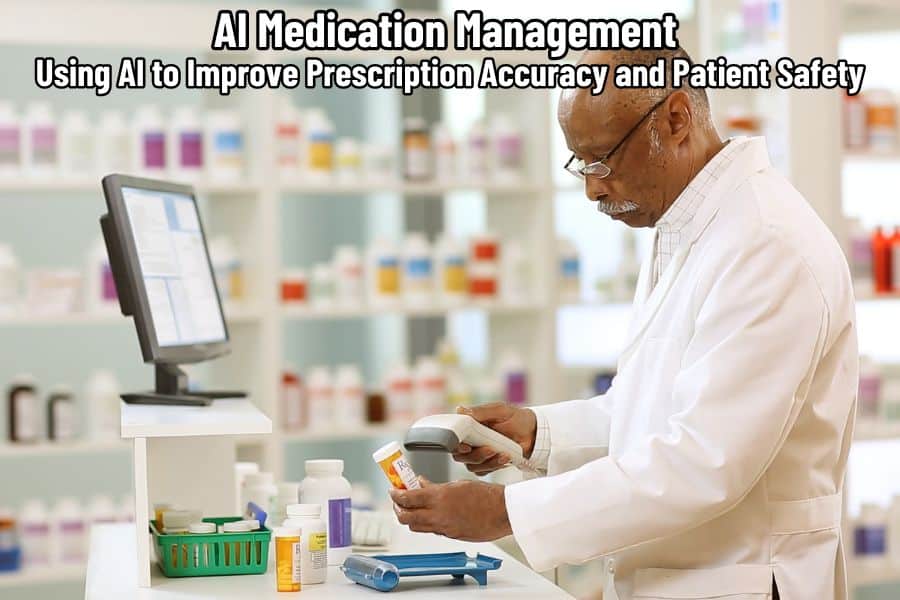
Dive into an arena where precision isn’t merely valued but is imperative for survival and wellness. In the meticulous world of medication management, where a minuscule deviation can cascade into critical consequences, healthcare AI applications emerge as the quality control specialists. Diligently ensuring that every dosage is not merely administered but is impeccably accurate, reducing risks, and safeguarding health.
Leveraging AI to Improve Prescription Accuracy
Step into a realm where healthcare AI applications stand as the gatekeepers of precision, vigilantly ensuring every prescribed dosage resonates with absolute accuracy. Envision an ecosystem where AI meticulously analyzes patient data, medical histories, and concurrent prescriptions. Ensuring every recommended dosage is not merely accurate but is tailored for optimal efficacy and safety.
In this universe, AI traverses beyond mere calculation, emerging as an intelligent advisor, ensuring every prescription is not merely a dosage but is a finely-tuned recommendation. All meticulously crafted, and stringently validated, mitigating risks and safeguarding every patient’s journey towards wellness.
Enhancing Patient Safety with Automated Dosage Control
Moving forward, visualize a world where healthcare AI applications evolve into automated dosage controllers, meticulously administering every dose with unerring accuracy, ensuring patient safety is not merely a guideline but a steadfastly enforced practice. These applications navigate through every dosage, ensuring each is not merely administered but is optimally controlled. And maintaining a steadfast adherence to prescribed limits, and diligently mitigating risks.
In this domain, healthcare AI applications craft a sanctuary where dosage control isn’t merely automated but is fiercely safeguarded, ensuring every patient is shielded from the perils of dosage errors, safeguarding their journey towards recovery, and enhancing their pathway towards sustained wellness.
Moving forward, our next application is AI and robot-assisted surgery.
Advancing Surgical Precision with Robot-assisted Surgery

Embark on a journey where technological prowess meets surgical precision, crafting a sanctuary where every incision, maneuver, and suture is not merely an action but a meticulously calibrated movement. Within this innovative domain, healthcare AI applications unfurl as a revolutionary tool, not merely assisting but advancing every nuance of robot-assisted surgery, sculpting a future where surgical outcomes are not just enhanced but are consistently achieved with unerring precision.
Enhancing Surgical Outcomes through Robotic Assistance
Envision a realm where healthcare AI applications breathe life into robotic systems, empowering them with the capability to navigate through the complexities of human anatomy with unparalleled precision. Here, every surgical intervention is not merely an operation but a symphony of meticulously calibrated movements, ensuring each incision, extraction, and implantation is executed with unparalleled accuracy and minimal invasiveness.
In this landscape, the finesse of robotic arms, under the steadfast command of AI, ensures that surgical outcomes are not merely favorable but are consistently optimal, minimizing risks, reducing recovery periods, and enhancing the overall efficacy of every surgical intervention.
Implementing AI in Pre- and Post-Operative Care
Moving further, delve into a sphere where healthcare AI applications ascend beyond the surgical suite, immersing into the critical realms of pre- and post-operative ca
re. Imagine a system where AI meticulously analyzes every fragment of pre-operative data, ensuring every patient is not merely prepared but is optimally conditioned for surgery, minimizing risks and optimizing the canvas upon which robotic arms shall craft their precision.
Post-surgery, visualize healthcare AI applications morphing into vigilant sentinels, continuously monitoring every nuance of the recovery process, ensuring post-operative care isn’t merely a phase but a personalized journey. Meticulously crafted to enhance recovery, mitigate risks, and ensure every surgical intervention is succeeded by an optimal pathway towards wellness and recuperation.
For our next application, we’ll be talking about AI and automated image diagnosis.
Reinventing Diagnostic Approaches with Automated Image Diagnosis
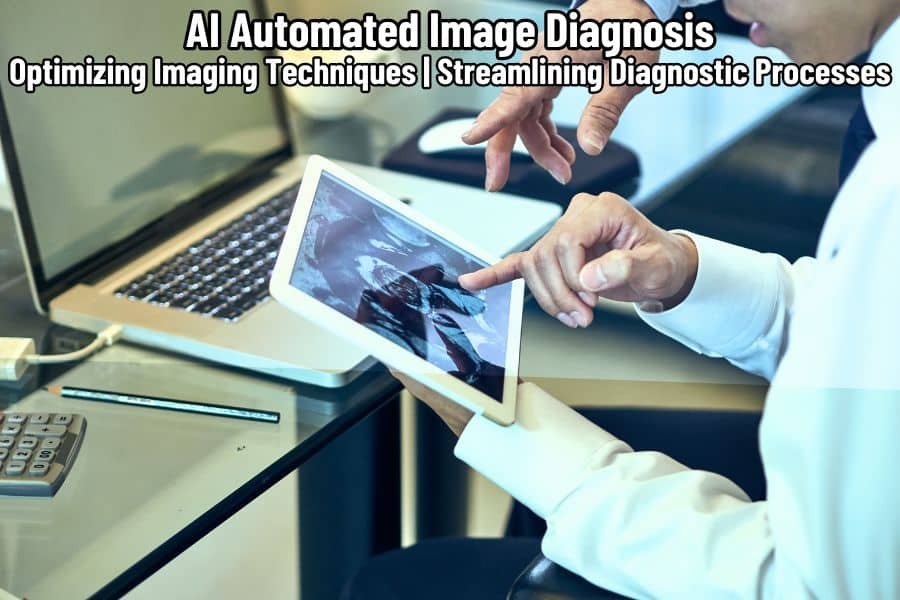
Pioneering the frontier of medical imaging, healthcare AI applications are rewriting the narratives of diagnostic methodologies. Making certain that every pixel, contour, and pattern within medical images doesn’t merely reveal, but unequivocally communicates the tales of underlying physiological narratives. Within this dynamically evolving terrain, automated image diagnosis doesn’t just remain a technological feature but transforms into a potent ally for healthcare professionals.
Optimizing Imaging Techniques through AI Algorithms
Sail across a sea where healthcare AI applications become the meticulous crafters of imaging excellence, harnessing the power of algorithms to transform imaging techniques from mere technological processes into precision-tuned, data-rich diagnostic tools. Envision a scenario where every scan is not just a capture but an intelligent compilation of meticulously analyzed data points. The robustness of AI algorithms ensures that every anomaly, every deviation, and every potential concern within medical images is not merely observed but is thoroughly, rigorously examined.
Immerse yourself into a realm where AI elevates imaging from a static view into a dynamic diagnostic dialogue, where every contrast, every shadow, and every pattern is deciphered, analyzed, and comprehensively understood. The diagnoses are not merely derived but are meticulously crafted, emanating from a fusion of technological prowess and deep, algorithm-driven insights.
Streamlining Diagnostic Processes with Intelligent Systems
Moving into a sphere where healthcare AI applications seamlessly weave into the fabric of diagnostic processes, envision a system where intelligence and automation converge to craft an ecosystem of streamlined, efficient, and profoundly insightful diagnostic journeys. Within this domain, every image is not just analyzed but is woven through a sophisticated web of intelligent systems. The diagnostic processes are not just expedited but are enriched, empowered, and enhanced through a seamless fusion of technological and clinical expertise.
Let’s shift our focus to the next application, healthcare finances and AI fraud detection.
Shielding Finances with Robust Fraud Detection

Plunge into an era where financial safety isn’t a mere checkpoint but a fortified, impenetrable fortress, thanks to the versatile capability of healthcare AI applications. These applications are not just tools but vigilant sentinels, safeguarding the fiscal landscape of healthcare from the malevolent shadows of fraud, misappropriation, and fiscal mismanagement. As we navigate this vital aspect of healthcare management, let’s meticulously unravel how AI doesn’t just detect but robustly shields financial avenues from the potential pitfalls of fraud and fiscal inconsistencies.
Deploying AI to Identify and Prevent Healthcare Frauds
The prowess of healthcare AI applications morphs into a potent barrier, meticulously identifying and staunchly preventing potential frauds even before they can permeate the fortified walls of your financial management systems. Imagine a realm where AI’s keen, algorithmic eyes meticulously scan through every transaction, every fiscal movement, and every financial activity. Ensuring that anomalies, inconsistencies, and potential fraud markers are not just identified but are robustly thwarted.
Meander through a domain where healthcare AI applications become your unwavering allies, ensuring that each penny, each transaction, and each financial commitment is not merely a numerical movement but a thoroughly scrutinized, algorithmically validated action. This protects your healthcare institution from the unpredictable variables of fraudulent activities.
Ensuring Financial Security with AI-powered Audit Systems
Dive into a future where the auditing process isn’t just a regulatory necessity but a comprehensive, AI-powered fiscal examination, ensuring that every financial pathway, every transaction, and every fiscal commitment is not just accounted for but is held against the stringent, unerring standards of AI-powered audit systems. Healthcare AI applications become the meticulous auditors. Financial data is not merely calculated but is comprehensively analyzed, ensuring that financial security isn’t a mere goal but an unwavering, fortified reality.
Transitioning to the next application, let’s discuss AI and clinical trials.
Expanding Patient Care through Clinical Trial Participation

Ah, the revered landscape of clinical trials – a domain of perpetual exploration, where innovation and critical examination coalesce, forging the paths to groundbreaking healthcare solutions. Here’s the truth – harnessing the potency of healthcare AI applications is not merely an advanced strategy but a revolutionary approach in amplifying the realms of patient care, especially within the nuanced avenues of clinical trial participation.
Facilitating Inclusive Clinical Trials with AI Recruitment
Let’s tread onto the terrain where healthcare AI applications meticulously weave through the complex tapestry of patient data, demographic variables, and tailored healthcare requirements, constructing a bridge that unifies potential participants with pertinent clinical trials. Ponder this – an ecosystem where AI does not just facilitate but energetically champions the cause of inclusive, comprehensive, and highly-tailored patient recruitment for clinical trials.
What we witness here is not merely recruitment but a sagaciously orchestrated synchronization of patient profiles with clinical trials, ensuring each participant is not just a contributor but a beneficiary of innovative medical explorations. Healthcare AI applications delve into the profound depths of data, skillfully aligning patient histories, genetic predispositions, and targeted medical needs with the ideal, often life-altering, clinical trials, thereby amplifying the spectrum of inclusive patient care.
Enhancing Trial Outcomes with Data-Driven Insights
As we navigate further, healthcare AI applications unfurl as potent tools, which don’t just compile but astutely analyze a vast expanse of data, providing researchers with invaluable, data-driven insights that have the power to meticulously enhance clinical trial outcomes. Visualize a scenario where every data point, from patient responses and biomedical indicators to variable interactions and potential anomalies, is not merely observed but deeply analyzed, bringing forth insights that are not just relevant but pivotal for the targeted progression of clinical trials.
With healthcare AI applications, clinical trials transcend beyond the conventional pathways, ushering in an era where every patient interaction, every biomedical response, and every potential outcome is scrutinized through the lens of data-driven clarity.
Finally, we can’t talk about healthcare AI applications without covering the development of new medicines using AI.
Pioneering Healthcare: Development of New Medicines

Embark on a journey with me, where technology and medicine intertwine in a dance so seamless, it propels us into a future where healthcare AI applications are the torchbearers of new-age medical breakthroughs. It’s not simply about adopting technology; it’s about pioneering an evolution, a revolutionary stride into realms where the development of new medicines is not just expedited but also meticulously crafted to perfection.
Accelerating Drug Development with AI Analysis
Dive into the vast ocean of drug development and what greets you is a complex web of research, trials, and unending data points. Now, imagine the potentiality of healthcare AI applications navigating through this intricate web, providing unprecedented accuracy, speed, and efficiency in analyzing multifaceted data. We’re not merely speaking of facilitation. We are exploring a universe where AI doesn’t just assist but leads the charge in decoding genetic structures, predicting molecular behaviors, and unveiling potential drug compounds at a pace that was once deemed unattainable.
Here, healthcare AI applications emerge as the linchpin, significantly reducing the time frame from initial research to the development of viable drug candidates. It’s not merely a step forward; it’s a giant leap towards ensuring that essential, potentially life-saving drugs are developed, tested, and made available to the global populace with a vigor and precision that sets new benchmarks in the pharmaceutical realm.
Reducing R&D Timelines with Predictive Modelling
Picture this: a world where the long, often tumultuous road of drug R&D is transformed into a streamlined pathway, thanks to the profound capabilities of healthcare AI applications. The essence lies in the potent ability of AI to harness predictive modeling, thereby astutely forecasting outcomes, potential roadblocks, and success trajectories in the R&D processes.
With healthcare AI applications, predictive modeling transcends beyond mere data analysis, offering researchers a valuable telescope through which the foreseeability of research outcomes and drug efficacy is not just enhanced but pinpointed with immaculate accuracy. This not only curtails the traditional timelines associated with drug R&D but also ensures that the journey from the research phase to clinical trials is smooth, well-orchestrated, and devoid of unforeseen hurdles.
Conclusion: Bridging Gaps with Improved Healthcare Access

In the healthcare sector, where every second is pivotal, harnessing the vast capabilities of healthcare AI applications becomes not just beneficial but imperative in ensuring that care is widespread, encompassing, and indiscriminately accessible. The sheer brilliance of AI doesn’t just reside in its technological prowess but in its capacity to bridge the often glaring gaps, ensuring that healthcare doesn’t remain confined to the physical boundaries of hospitals and clinics.
Enhancing Remote Patient Monitoring with AI
Let’s draw the curtains on a future where distance doesn’t dictate access to healthcare, and healthcare AI applications illuminate the path towards robust and seamless remote patient monitoring. Picture this: wearables and smart devices, embedded with AI, meticulously monitoring, analyzing, and reporting patient data in real-time to healthcare professionals residing in a completely different geographical spectrum. But it doesn’t stop there. AI isn’t merely a silent observer; it is an active participant that not only monitors but also provides timely alerts, predictions, and even preliminary diagnoses based on the data it relentlessly analyzes.
The realm of possibilities with healthcare AI applications in remote patient monitoring is boundless. From predicting potential health anomalies before they escalate to providing crucial data that aids in ongoing treatment plans, AI becomes the unseen sentinel that vigilantly guards, predicts, and assists in patient care, ensuring that quality healthcare is not just a physical reality but a virtual possibility as well.
Democratizing Healthcare through Intelligent Solutions
Segueing to a broader spectrum, healthcare AI applications are the catalysts propelling the democratization of healthcare, breaking down traditional barriers, and making quality healthcare accessible to the masses. Be it intelligent diagnostic applications that reduce the need for specialist interventions in preliminary stages, or AI-driven bots that provide initial consultation based on symptoms, AI ensures that basic healthcare permeates to regions where traditionally it might have been scarce.
This is a world where healthcare isn’t monopolized by socio-economic status or geographical location. This is a world where healthcare AI applications facilitate intelligent solutions, ensuring that everyone, regardless of where they are or what they earn, has access to quality healthcare advice, monitoring, and even preliminary diagnoses.
In weaving this narrative, our journey through the burgeoning potentialities of healthcare AI applications finds a melodious rhythm, marrying technological sophistication with humane applications. It’s not merely about AI; it’s about leveraging AI to enhance, extend, and elevate healthcare, thereby revolutionizing medicine in a manner that’s as compassionate as it is innovative.
Frequently Asked Questions

Navigating the landscape of healthcare AI applications brings to the forefront an array of questions, bubbling from a cauldron of curiosity, skepticism, and a thirst for knowledge. A technological intervention as profound as AI in healthcare invariably piques inquiries and, sometimes, apprehensions. Thus, it is paramount to traverse through these common questions, dispelling myths, and unveiling the actualities of AI applications in the meticulous realm of healthcare.
How Do Healthcare AI Applications Enhance Patient Care?
In the intricate tapestry of patient care, healthcare AI applications weave a layer of precision, personalization, and proactive interventions. AI algorithms proficiently analyze patient data, predict potential health risks, and facilitate healthcare professionals in devising targeted treatment plans. Furthermore, through AI, patients receive timely reminders, dietary recommendations, and continuous monitoring, ensuring a holistic, enhanced care approach that transcends traditional methodologies.
Can AI in Healthcare Make Diagnostic Processes More Accurate?
Absolutely, healthcare AI applications significantly augment the accuracy and efficiency of diagnostic processes. Utilizing advanced algorithms, AI can analyze complex medical images, recognize patterns imperceptible to the human eye, and provide insightful diagnostic suggestions. This not only enhances the accuracy of diagnoses but also expedites the process, facilitating quicker, and more efficient patient management.
Is Patient Data Safe with Healthcare AI Applications?
Safeguarding patient data is pivotal, and healthcare AI applications are architected with robust security protocols to ensure data integrity and confidentiality. AI systems in healthcare adhere to stringent data protection regulations, employing advanced encryption and secure data transmission methods to shield sensitive patient information from unauthorized access and potential breaches.
How Do AI Applications Assist Healthcare Professionals?
Healthcare AI applications serve as invaluable allies to healthcare professionals by automating repetitive tasks, providing diagnostic assistance, and managing vast pools of patient data efficiently. This allows medical practitioners to allocate their time more effectively, focusing on patient interaction and critical decision-making, while AI manages data-driven tasks with precision and reliability.
Does AI Replace Human Intervention in Healthcare?
No, healthcare AI applications are designed to augment, not replace, human intervention. While AI assists in data management, preliminary diagnostics, and task automation, the pivotal decisions, empathetic patient interactions, and nuanced clinical judgements remain securely within the realm of healthcare professionals. AI acts as a supportive tool, enabling healthcare providers to deliver enhanced, data-informed care.
Can Healthcare AI Applications Improve Access to Healthcare Services?
Indeed, healthcare AI applications break down geographical and socio-economic barriers, democratizing access to healthcare services. Through telemedicine, remote monitoring, and AI-driven consultations, patients from varied locations and economic strata can access vital healthcare services. This ensures that quality healthcare is not an exclusive privilege but an accessible right to all.
Embarking on a journey through the world of healthcare AI applications reveals a path that intertwines technology and healthcare, crafting a future where patient care is not just technologically advanced but is also accessible, precise, and extraordinarily patient-centric. It’s a harmonious melding where technology amplifies the reach and quality of healthcare, promising a future where well-being is a universally accessible treasure.
Resources
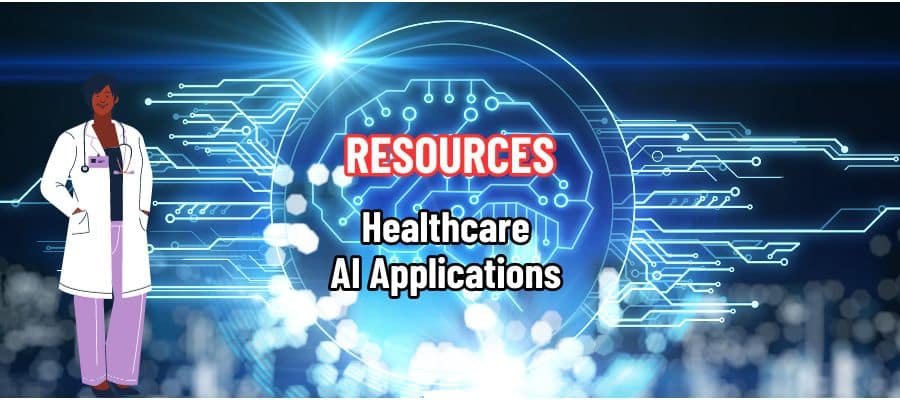
Embarking upon the enriched terrain of healthcare AI applications, one encounters a treasure trove of knowledge waiting to be unfolded. As you delve deeper into the realms of AI-powered healthcare, these resources will prove to be your loyal companions, guiding you through intricate alleys of this transformative journey. Each resource, carefully curated, provides a distinctive lens through which you can further explore and understand the nuances and advancements of AI applications in healthcare.
Articles
The realm of articles is bustling with insightful, timely information, and acts as a key to unlock the ever-evolving world of healthcare AI applications. From understanding current trends to exploring real-time applications, articles serve as a magnificent repository to stay abreast of advancements, challenges, and innovations in the field.
“AI in Healthcare in 2023 Means Better Patient Care”: An in-depth exploration of AI applications and their transformative impact on various aspects of healthcare.
“AI-Driven Medical Diagnosis: The Dawn Of A New Era In Healthcare”: Delves into practical insights on how healthcare AI applications are revolutionizing patient care, diagnostics, and administrative functions.
Books
Books provide a comprehensive, in-depth exploration of concepts, methodologies, and implications of AI in healthcare, crafting a robust foundation of knowledge. They weave through theoretical and practical aspects, providing a well-rounded perspective on healthcare AI applications.
“Artificial Unintelligence” by Meredith Broussard: A thought-provoking dive into the promises and perils of technology and AI in the broader spectrum, including healthcare.
“Deep Medicine: How Artificial Intelligence Can Make Healthcare Human Again” by Eric Topol: A fascinating read that explores the intersection of empathy and technology in reshaping healthcare.
Case Studies
For those inclined towards practical insights and real-world applications, case studies unveil the tangible impact and applications of healthcare AI applications in various scenarios, acting as a window to explore the practical deployment and results of AI in diverse healthcare settings.
“IBM Watson: Pioneering AI-driven Oncology Solutions”: A riveting exploration into how AI is facilitating groundbreaking advancements in cancer treatment.
“DeepMind and Moorfields Eye Hospital: AI in Ophthalmology”: Investigating the role of AI in diagnosing eye diseases with enhanced precision and speed.
Podcasts
Podcasts serve as a dynamic and engaging platform, providing access to discussions, interviews, and insights from experts, researchers, and practitioners in the field of healthcare AI applications.
“AI in Healthcare Podcast”: A vibrant platform that brings together healthcare professionals and AI experts discussing the transformative impact of AI applications in healthcare.
“The Digital Health Experience”: Explores the amalgamation of technology and healthcare, with specific episodes dedicated to AI applications, their development, and impact.
Tools
Engage with hands-on experiences and explore the practical aspects of healthcare AI applications with various tools and platforms designed to provide tangible interaction with AI technologies in healthcare.
IBM Watson Health: A tool that exemplifies the practical application of AI in processing healthcare data, offering solutions in drug discovery, and facilitating personalized medicine.
Google Cloud Healthcare API: A resource that integrates AI and machine learning capabilities with healthcare data, aiding in enhanced decision-making and patient experiences.
Attention Entrepreneurs
Get 100% FREE All-In-One Digital Marketing Platform: [CLICK HERE TO LEARN MORE]

